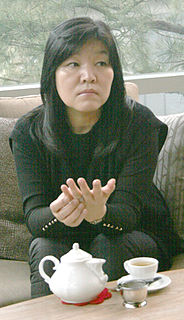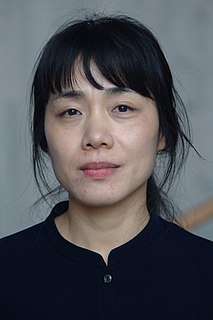Related Research Articles
Han Soosan (Korean: 한수산) is a South Korean writer.

Kyung-Sook Shin, also Shin Kyung-sook or Shin Kyoung-sook, is a South Korean writer. She is the first South Korean and first woman to win the Man Asian Literary Prize in 2012 for Please Look After Mom.
Yi Seungu is a South Korean writer.
Kang Eun-gyo is a South Korean poet and Professor Emerita at Dong-a University.
Ko Hyeong-ryeol born 1954 is a modern Korean poet.
Hwang Donggyu is a South Korean poet, academic and critic.
Mah Chonggi is a Korean poet.
Lee SungBoo was a South Korean poet and novelist.

Park Jaesam was a Korean poet.

O Seyeong is a South Korean poet, critic, educator, and professor at Seoul National University. He has been awarded the Korean Poets’ Association Prize, the Nokwon Literary Award, the Cheong Chi-Yong Literature Prize, the Pyun-Woon Literary Prize, the Gong Cho Literary Award, and the Manhae Literature Prize in Poetry.
Lee Geunbae, is a South Korean sijo poet. He is known for his compositions on Korea's traditions and indigenous environments. He is one of the major contemporary sijo poets. In 2002, he was chosen as chairman of the Society of Korean Poets. He has served as the director of the Korean Headquarters of the International PEN. He is currently a creative writing professor at JEI University.
Son Taek-su is a South Korean poet and editor.
Shin Dalja is a South Korean poet.
Cheon Yanghui is a South Korean poet, best known for her poetry collection Sorghum Field of the Heart.
Choi Dong-ho is a South Korean poet, critic, and professor. He studied Korean literature at Korea University at both the undergraduate and graduate levels. He taught Korean literature until his retirement at Korea University, where he is professor emeritus. He published his first poetry collection in 1976, and debuted as a critic when his critical essay won the Joongang Ilbo New Writer’s Contest in 1979. He has written a number of monographs on the spirit of poetry, Eastern poetics, and geukseojeongsi, a term he coined to describe short, easy to understand, and highly evocative poetry. He won the Park Dujin Literary Award in 2009 and the Yushim Award in 2013. Currently, he serves as the president of the Society of Korean Poets and Sisarang Arts and Culture Association.

Kim Sum is a South Korean writer, best known as the author of One Left, a novel dealing with the issue of Korean comfort women in the Imperial Japanese Army.

Kim Haengsook is a South Korean poet.
Kim Kyunghu is a South Korean poet.

Jin Eun-young is a South Korean poet and philosopher. She has been praised by the poet Choi Seung-ja, who said “I’ve finally found a poet whom I can call my true successor."
Kim Kyungrin was a South Korean poet. In a changing world, he pursued poetry that embodied modern gazes and expressions. Along with Park In-hwan and Lee Bong-rae, Kim led the modern poetry movement in South Korea in the 1950s. When postmodernism became a global trend in the 1980s, he actively accepted and incorporated concrete poetry, projective verse, and minimalism in his poetry and poetics.
References
- ↑ "Park Sangsoon > Authors | Seoul International Writers' Festival". Archived from the original on 2018-03-09. Retrieved 2017-03-02.
- ↑ Sangsoon, Park; Anthony, Brother; Eun-Gwi, Chung (2015). "I Exist Filthily, and: Marana: Heroine in a Porno Cartoon. Part 3, and: Marana: Heroine in a Porno Cartoon. Part 4, and: Nonsenso, and: Passing the Cotton Field the Boy Went Away". Azalea: Journal of Korean Literature & Culture. 8: 253–262. doi:10.1353/aza.2015.0011. S2CID 190962470.